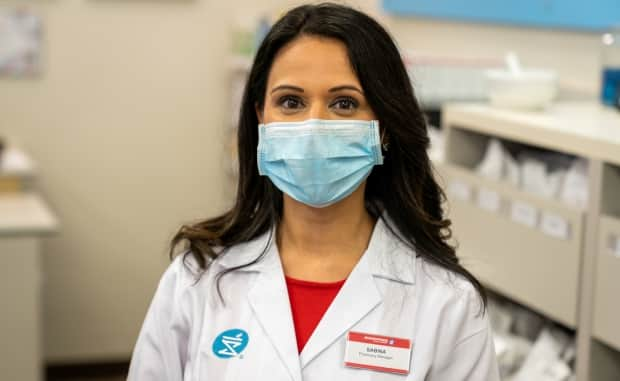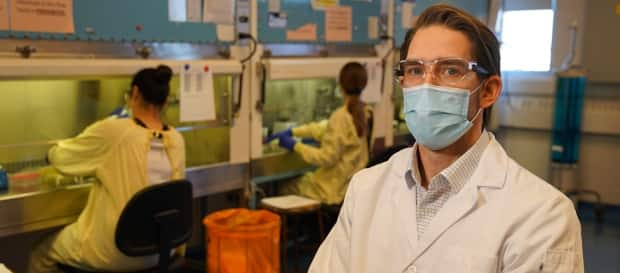Pilot programs reveal benefits and limitations of COVID-19 rapid testing

On a recent weekday afternoon, a fishing vessel called the Arctic Endurance prepared to depart from Mulgrave, N.S., for a month-long clam harvesting trip. Blustery winds blew snow across the ship as it left the dock, but at least on the pandemic front, the coast was clear.
All 35 crew members had undergone testing for COVID-19 within the previous 24 hours, and all their results were negative.
Their employer, Clearwater Seafoods, organized the tests. The company bought its highly accurate polymerase chain reaction (PCR) testing kits from Precision Biomonitoring last fall, putting it among the early corporate adopters of mobile COVID-19 testing technology in Canada. The tests are like those used in health care settings, but results come back in just a couple of hours.
Tony Jabbour, vice-president of Fleet Operations, admits it was a gamble.
"We're harvesters, we're not lab technicians or medical professionals. And so getting a fairly complicated system purchase set up was a fairly big undertaking for us," he said.
Onboard challenges related to physical distancing had compelled the company to put in place added COVID-19 precautions for its crews. Clearwater hasn't seen any outbreaks to date, but Jabbour said asymptomatic transmission onboard a vessel would be "catastrophic," both on the business side and for employees.
"Throughout this, I think we've been really cognizant of the fact that people are leaving home to go to sea," he said. "And making sure we take that extra level of precaution was certainly comforting."

It's a notion that has enticed numerous Canadian businesses and institutions to begin pilot programs of their own for onsite COVID-19 testing. As Canadians await full access to vaccines and essential workplaces continue to guard against outbreaks, the appeal of screening asymptomatic front-line staff is growing, driven partly by wider availability of the technology in Canada.
At a busy Shoppers Drug Mart pharmacy in Mississauga, employees without COVID-19 symptoms can get tested twice a week for the virus. Though many pharmacies are already equipped to offer PCR testing to members of the public who meet certain criteria, this new employee-focused pilot uses rapid antigen tests. These are not currently as accurate
as PCR, but require a less invasive nasal swab and deliver results much faster.
"Results are being given to me within 15 minutes, so you can't really beat that," said Sabina Kapoor, a pharmacist at the store who is participating in the trial program.
With a front-line job and two children at home, Kapoor said she didn't hesitate when the store offered her regular screening for COVID-19 using rapid tests.
"It brings some sort of security and comfort, I think, when we go home to our families after a shift or working the full week. So, I think everyone was pretty much on board for it," she said.

Parent company Loblaw is currently offering rapid tests to employees at 20 of its pharmacy and retail locations in Ontario and Alberta. As part of the pilot, staff at the company's Medisystem service, which provides pharmaceutical services to seniors residences and care homes, can also stop by participating stores to get tested.
If the program is deemed successful, Loblaw said it plans to offer the rapid-testing service to other small and medium-sized businesses and their employees — in a sense, outsourcing workplace COVID-19 testing.
According to Ashesh Desai, the executive vice-president of Pharmacy and Healthcare at Shoppers Drug Mart, employees of participating workplaces could get tested at their local Loblaw pharmacy in the near future.
"So, if I'm grocery shopping [on] Sunday afternoon, maybe there's an opportunity for me to book a screen at that time," he said.
Desai added that the test results would go to the employer, and as is currently done for those participating in the pilot, anyone with a positive antigen test result would have to seek out a regular PCR test at a hospital or test centre for confirmation.
Rapid antigen testing cannot be used 'to rule out infection'
A negative test "does not mean you can let down your guard," said Desai. He added that Loblaw is working on messaging to convey that masks and social distancing are still "extremely important," even when a workplace is regularly using rapid tests.
University of Alberta infectious disease specialist Dr. Lynora Saxinger cautions that rapid antigen testing cannot be used "to rule out infection."
While research on the reliability of rapid tests is growing, the current understanding is that people can rely on a positive test result, but not on a negative one, she added, "which kind of goes against human nature a little bit."
"It's just an extra step," said Antonella Picillo, director of student services at Le Pensionnat du Saint-Nom-de-Marie in Montreal, which is trying out the use of daily rapid testing on the school's asymptomatic students and teachers.
The private school has a now-familiar myriad of COVID-19 precautions in place, from mandatory masks, to class bubbles, to ventilation upgrades. Rapid test screening is, "just one more way to make sure we have a handle on the situation," Picillo said.

The idea was proposed by Dr. Caroline Quach, a pediatric infectious diseases consultant at Montreal's Sainte-Justine Hospital, as well as a parent at the school.
"I think that in a classroom, when you have a [coronavirus] case and you screen the students around them, you might be able to find secondary transmission right away," Dr. Quach said.
The goal of the pilot program is to research how well random, daily rapid testing can do that in a school setting. But the limitations of widespread rapid testing are also becoming clearer.
"I'm not convinced that using these rapid tests on a larger scale to screen everybody walking into the school without symptoms is actually a good use of resources," Dr. Quach said.
One of the main reasons, she explains, is that administering and processing those tests is labour intensive.
It's one of the reasons there has been less widespread adoption of testing so far across the country. According to the Public Health Agency of Canada, the federal government has delivered nearly 17 million rapid tests to the provinces, but only a fraction
With resources across public health systems already strained, Dr. Saxinger said, "there's limited bandwidth to expand things" when it comes to rapid testing.
"A lot of places have been doing relatively limited pilot testing of these, but haven't yet had the capacity to roll them out more broadly," she said.
It's an issue the Province of Manitoba has been trying to tackle as it offers rapid testing for educators in the province. Teachers are getting access to rapid testing if they display COVID-19 symptoms, with the idea being they'll get a potential positive result back faster.

The province has partnered with Red River College to design a micro-credential program to train more people in the skills required to properly process rapid tests, such as transferring liquids using a pipet tube.
"When you're doing the COVID-19 testing, it's really important that that pipetting is done accurately and precisely to produce reliable, trusted results," said Curtis Aab, acting chair of the life sciences department at Red River College.
However, despite the issues around accuracy and administering rapid tests, Dr. Saxinger said targeted use in controlled settings, such as schools and places where people work face-to-face, makes sense.
"I think there's a possibility that these can add a layer of safety when they're applied in a structured way to the right places," she said.
Watch full episodes of The National on CBC Gem, the CBC's streaming service.

